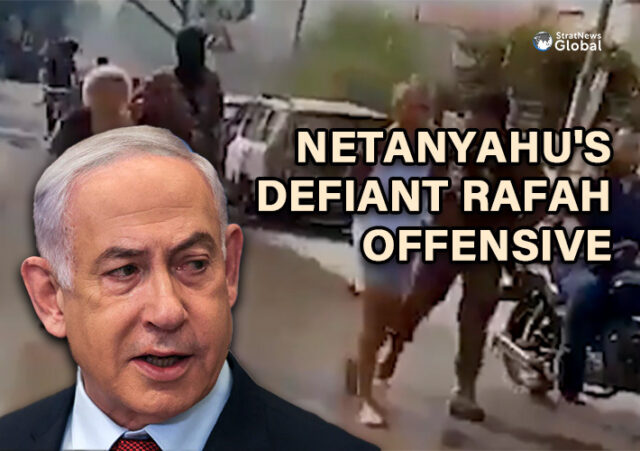Israel is facing intense international pressure to abort plans for a major military offensive in the densely populated Gaza city of Rafah. Prime Minister Benjamin Netanyahu, however, remains defiant, doubling down on his intent to launch the assault despite warnings it could unleash catastrophic humanitarian consequences.
Rafah, Gaza’s southernmost city bordering Egypt, is currently sheltering an estimated 1.5 million Palestinians displaced from other parts of the territory by the ongoing conflict with Israel. Many have already been uprooted multiple times during the latest round of hostilities between Israel and Hamas, the militant group governing Gaza.
Netanyahu insists there can be no future for peace unless Hamas’ forces are completely “eliminated” from Rafah through a large-scale Israeli incursion into the city. He has approved plans for the evacuation of Palestinian civilians ahead of such an offensive, which could last several weeks according to the prime minister.
The potential for massive casualties and displacement in an assault on the densely packed city of Rafah has raised alarm among international aid agencies and leaders like the head of the World Health Organization. Critics warn the human costs would shatter prospects for any peaceful resolution to the Israeli-Palestinian conflict.
German Chancellor Olaf Scholz, during a visit to the region over the weekend, directly challenged Netanyahu on whether the stated goals justify such “terribly high costs” in Rafah. He questioned if there are alternative ways for Israel to neutralize the Hamas threat besides a major urban offensive that could prove disastrous.
The warnings from Germany’s leader reflect broader international opposition to Netanyahu’s Rafah plans from allies like the United States as well as the United Nations. President Biden has called a large-scale assault in Rafah a “red line” for Washington.
Despite the appeals to avoid an escalation, Netanyahu remains unmoved, accusing critics of having “short memories” about the violence Hamas has inflicted on Israelis. He declared “no international pressure will stop” Israel from achieving its military aims related to Hamas, including securing the release of hostages.
The prime minister’s hardline stance stems from the latest eruption of the long-running Israeli-Palestinian conflict. Hamas militants killed around 1,200 Israelis and took over 250 hostages in a October 2023 attack, one of the deadliest against Israeli citizens in decades. It sparked the current war which has killed over 31,000 Palestinians in Gaza according to Hamas’ health ministry.
With both sides rejecting negotiations and casualties mounting, concerns are growing about Gaza sliding into an even deeper humanitarian catastrophe should Netanyahu follow through on his Rafah threats. The Israeli army says it plans to move displaced Palestinians to temporary “humanitarian islands” within Gaza, though details remain scant.
The high stakes have prompted calls within Israel for a change in leadership, with a top US Democrat urging new elections. But Netanyahu remains determined to press ahead with military force to achieve his aims of degrading Hamas and preventing future attacks, even as anxious international partners warn of disastrous fallout from a Rafah assault.
Also See:
In a career spanning three decades and counting, Ramananda (Ram to his friends) has been the foreign editor of The Telegraph, Outlook Magazine and the New Indian Express. He helped set up rediff.com’s editorial operations in San Jose and New York, helmed sify.com, and was the founder editor of India.com.
His work has featured in national and international publications like the Al Jazeera Centre for Studies, Global Times and Ashahi Shimbun. But his one constant over all these years, he says, has been the attempt to understand rising India’s place in the world.
He can rustle up a mean salad, his oil-less pepper chicken is to die for, and all it takes is some beer and rhythm and blues to rock his soul.
Talk to him about foreign and strategic affairs, media, South Asia, China, and of course India.





